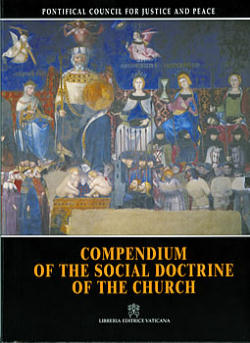|
" We need to build up society in the light of the Beatitudes, walking towards the Kingdom with the least among us." |
A possible approach for Action alerts
It might be daunting when faced with an Action alert. We can be dogged with many questions and feel insecure about what is the right thing to do. Here are some questions we might ask ourselves before we pray to God for His guidance, to reflect with care, to gain enlightened knowledge and to illuminate our choices by faith:
- Who is involved?
- Where in the world does this issue arise?
- When did the issue arise?
- What are the causes of the situation?
- What can be done to remedy the situation?
- What is the Church’s position on the topic?
Catholic Teachings on Social Justice

The COMPENDIUM OF THE SOCIAL DOCTRINE OF THE CHURCH presents the valuable foundations of Catholic Social Doctrine "as food for human and spiritual growth, for individuals and communities alike." It places the human person and society in relationship with the Gospel - the "Good News" of salvation, love, justice and peace for all and the whole person. It recognizes that moral values underpin natural law which form our conscience. "The document is presented as an instrument for the moral and pastoral discernment of the complex events that mark our time; as a guide to inspire, at the individual and collective levels, attitudes and choices that will permit all people to look to the future with greater trust and hope; as an aid for the faithful concerning the Church's teaching in the area of social morality." It extends an inclusive invitation to "all people to do all they can to bring about an authentic civilization oriented ever more towards integral human development in solidarity."
"The Christian knows that in the social doctrine of the Church can be found the principles for reflection, the criteria for judgment and the directives for action which are the starting point for the promotion of an integral and solidary humanism."
The basic principles to reconcile a society in justice and love are:
"The Christian knows that in the social doctrine of the Church can be found the principles for reflection, the criteria for judgment and the directives for action which are the starting point for the promotion of an integral and solidary humanism."
The basic principles to reconcile a society in justice and love are:
- Human Dignity and Freedom - This principle is the foundation of all the other principles. We are made in the image and likeness of God, loved unconditionally by Him. So, authentically living our God-given dignity and enabling others to live theirs glorifies God. Truly loving, as God does, is transforming.
- The Common Good - This principle teaches that the goods of the world are gifts to be shared rather than things to be possessed. Working towards the Common Good means making choices that are the most beneficial for all the people involved. The essential elements of the Common Good include: respect for persons, social development and well-being, and peace.
- Subsidiarity - Recognizing that we are in inter-relationship with others in society, this principle expects that every social activity ought of its very nature to furnish help to the members of the body social, and never destroy and absorb them. Subsidiarity is understood as the State providing economic, institutional or juridical assistance where required and never doing anything that would restrict initiative, freedom and responsibility.
- Solidarity - Recognizing our inter-dependance as one human family, the social principle of solidarity, is a moral and ethical virtue, "a firm and persevering determination to commit oneself to the common good" because we are all of us responsible for all, the living image of God made man. Peace is the fruit of solidarity.
These principles are inextricably linked to the fundamental values of the Church's Social Doctrine, they act in reciprocal relationship:
- Truth - We have a duty to respect truth and bear responsible witness to it.
- Freedom - recognizes that we are made in the image and likeness of God, our essential human dignity. “Far from being achieved in total self-sufficiency and the absence of relationships, freedom only truly exists where reciprocal bonds, governed by truth and justice, link people to one another” without losing ourselves. It is also our capacity to refuse what is morally negative.
- Justice - "consists in the constant and firm will to give their due to God and neighbour.” What is just is determined by the profound identity of the human being. Justice itself is only enough when inspired by the deeper power of the saving love of Jesus.